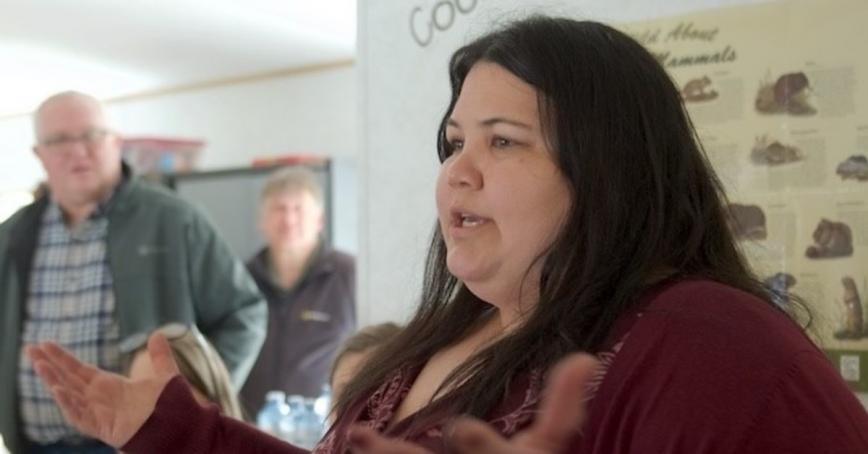A bridge between two worlds
Topics
Featured
Share online

Our personal experiences based on historic events, our families, and our culture, change how we see the world.
We all have a perspective. But some of us have two.
No one knows that more than Charla Huber, who graduated in 2020 with a Master of Arts in Professional Communication and is a new associate faculty member in the School of Tourism and Hospitality Management.
Huber is Indigenous with First Nations and Inuit heritage, but knows little of her biological family. She is a product of The Sixties Scoop, a period spanning from the late ’50s to the ’80s where Indigenous children were separated from their parents to be raised by non-Indigenous households across North America. It is through this experience that she has walked in two worlds her entire life.
Huber, recently became the executive director of NEED2, a non-profit that provides suicide prevention education and support. Before that, she was the director of communications and Indigenous relations for the M’akola Housing Society, the largest Indigenous affordable housing provider in BC. She has connected with more than 100 Indigenous communities in Canada and she has as seen first-hand how cultural communication styles differ.
Her interest in cultural communication led to want to better understand Indigenous ways of communicating and how that relates to the successful recruitment and retention of Indigenous employees.
Recognizing her commitment to applying her expertise to real-world problems, Huber received a research grant from both Mitacs and M’akola Development Services.
“It was a communications research project, but I wanted it to be Indigenous-led,” says Huber. “I interviewed nine Indigenous Knowledge Keepers that were all either Elders or leaders to help guide me. Traditionally in Indigenous communities you would go to Elders or leaders for guidance and I wanted to practice that.”
The research was initially going to be province-wide, but due to COVID-19 it needed to be narrowed down to Vancouver Island.
“Culture can be hard to explain, and we all have cultural nuances in our own lives that we might not even be mindful of,” says Huber. “This research unearths those nuances, in the words of the Elders and leaders. I am really excited about the growth that can be made in workplaces across Vancouver Island and beyond.”
Huber’s research has exposed how Indigenous values such as humility, removing unnecessary hierarchy, and creating a collective community can be incorporated into the organizational design and culture of any workplace to benefit all employees regardless of their background.
“The Knowledge Keepers were open about how stereotypes, bias and historical events such as residential school and colonization have impacted the daily lives of Indigenous people,” Huber says. “These are powerful words and ones that we need to listen to.”
Through her research, Huber is hoping to offer people an opportunity to better understand the lens Indigenous people may look through, particularly in the workplace.
A journalist by training, Huber worked as a newspaper reporter before joining M’akola in 2014. She enrolled at Royal Roads in 2018 and gained a lot more than she’d expected.
“Going in, I mostly wanted to prove that I was good enough. I knew I had the skills, but I wanted that piece of paper to make it official.”
Finding time for studies wasn’t always easy while single parenting, a full-time job and a range of volunteer gigs, but Huber says it was worth the effort.
In the end, “the experience totally changed how I do things. I’ve always worked really hard on a personal level to dispel negative stereotypes about Indigenous people. Now I’m able to take that lens and apply it...”
In her role at M’akola Housing Society, Huber worked with the society’s CEO to improve workplace and practices in small ways that could make a big difference – from bringing Elders to the workplace via Zoom to share their teachings, to changing the focus of performance reviews to better reflect Indigenous values. She hopes that the findings from her research can help guide other organizations along the same path.
Huber is promoting positive change on a broader level too, through her weekly column in the Victoria Times Colonist. Since 2017, she’s used her open, optimistic brand of storytelling to challenge assumptions and overturn stereotypes. Clearly, she’s making an impact.
As part of the Tomorrow Makers campaign for Indigenous student success and research grants, we're sharing stories of Indigenous alumni who are making a difference in the world. You can help future Indigenous leaders tackle climate change, sustainability and community development for this generation and for those to come. You can be a Tomorrow Maker by supporting one today.